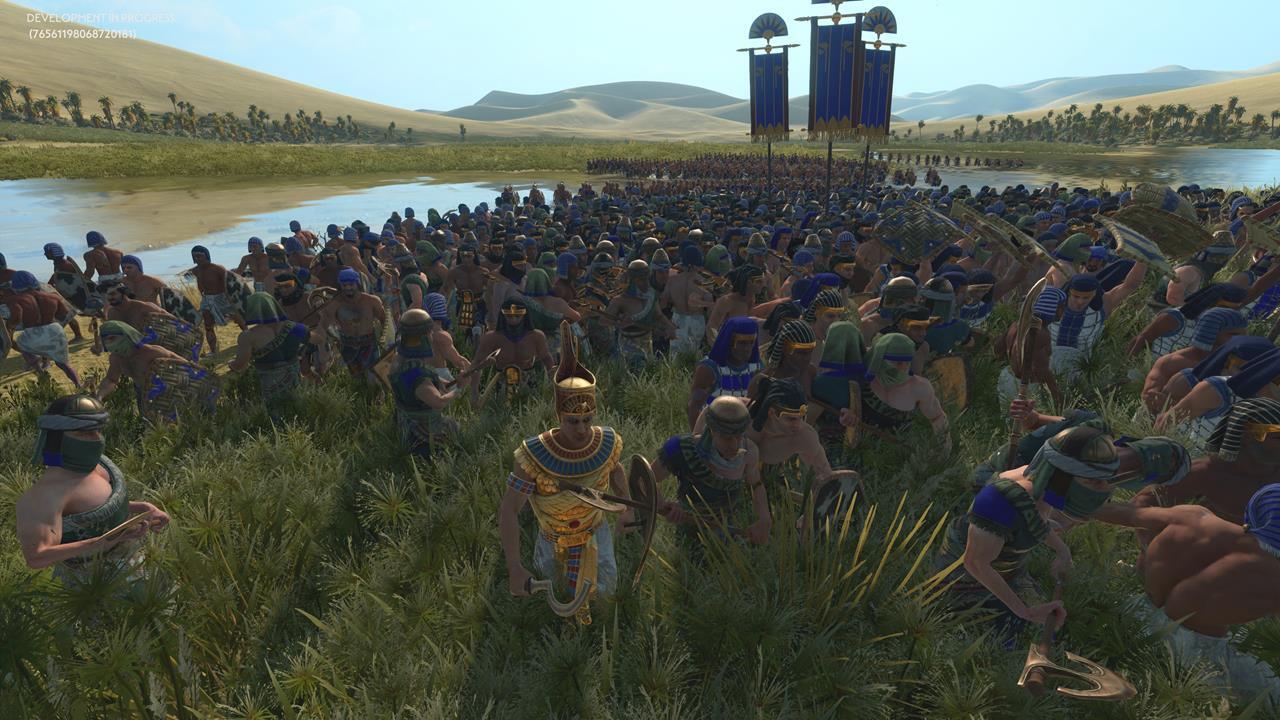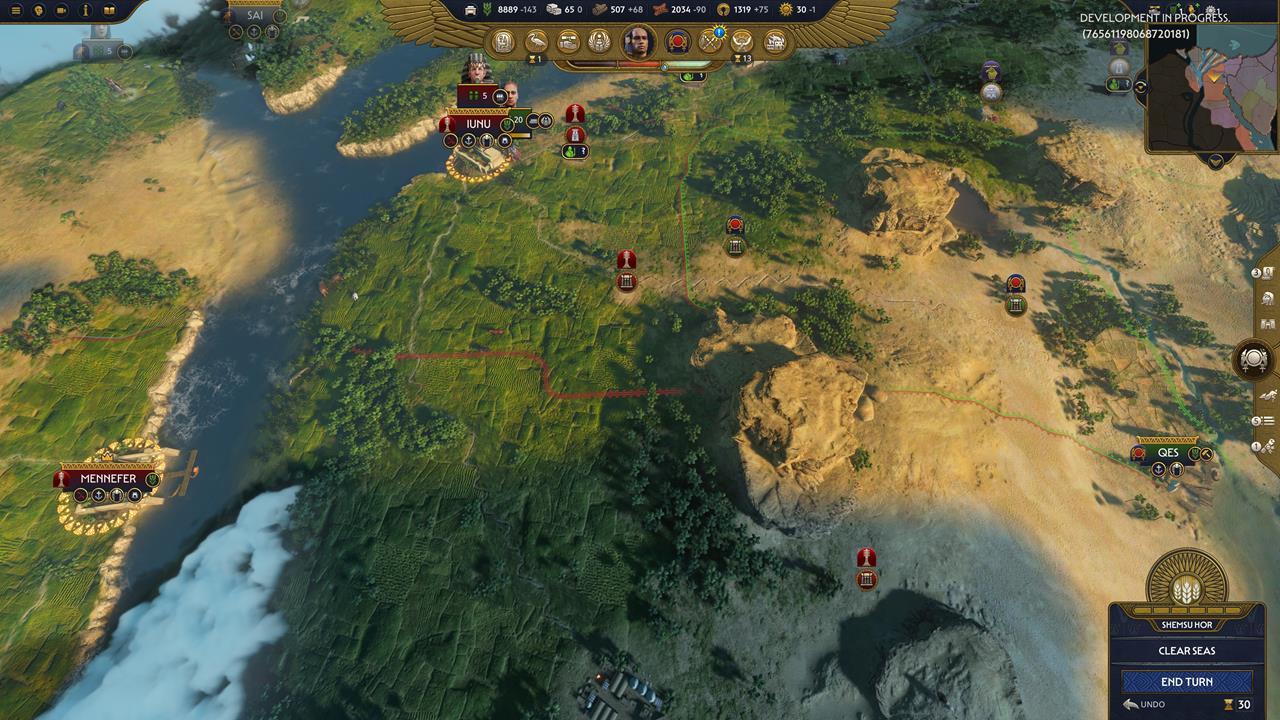Total War: Pharaoh takes you all the way back to 1,200 BCE, a time when Egypt asserted its dominance over North Africa, while Canaanites and Hittites vied for control in the Levant and Anatolia, respectively. This would, eventually, lead to a period known as the Bronze Age Collapse, where constant wars and disasters preceded the invasion of warriors known as the Sea Peoples.
Previously, we detailed how you engage in combat in our Total War: Pharaoh hands-on battle preview. Now, I was able to try the first 50 turns of Ramesses III’s campaign. Indeed, as someone who has played every Total War game since the original Rome, I can say that this might be the most feature-rich offering in the franchise, at least among the historical titles. However, I also noticed several issues, as well as potential mechanics that can cause rather artificial, « gamey » situations, though there is still time before release for these to be addressed.
Prior to starting the campaign, there is a full assortment of options that meaningfully change the way you play. You can tweak various mechanics, such as the availability of resources, the inclusion of deities for each culture, attrition damage, the frequency of disasters, increased campaign movement, diplomatic opinion thresholds, and more. There are even toggles for maxed-out general levels, rebellions, and Sea People invasions (more on this mechanic later). You’re no longer limited to the basic difficulty settings, as there are a plethora of options to fully customize your experience.
From there, I began conquering my neighbors, taking out opposing soldiers by making use of Ramesses’ elite Medjay troops. It’s worth noting that Pharaoh, being set in the Bronze Age, is far from the era of flaming catapults, cannonfire, and mounted cavalry. Instead, fighting is primarily done by melee infantry and ranged units (i.e. archers and slingers). It’s unlikely that you’ll field chariots early, as they’re too expensive to maintain.
As such, combat tends to grind down to a slower pace, as troops continue to engage within each melee press until the other side routs. As the battle progresses, dynamic weather can also affect your forces. If it gets too hot, the sweltering heat will fatigue your troops. Worse, sandstorms may cause poor visibility and casualties. Armor also degrades over time, so I had to be mindful of units that were fighting for longer periods.

Likewise, if you got used to dazzling commander or legendary lord abilities in, say, the Warhammer games or Three Kingdoms, then Pharaoh will bring you back to the days of yore when generals were only surrounded by their bodyguards. There are no frills, not even an Aristeia-like activation akin to Total War Saga: Troy. At best, there are abilities that provide buffs and debuffs. I found this to be a more grounded affair, which can be hit or miss depending on your disposition as a Total War veteran.
Skills are also more streamlined, as you now choose from three distinct « lines » (Presence/red, Fortitude/green, and Ardor/blue), each granting its own buffs. Upon reaching certain thresholds, you’ll be able to add titles (buffs that can be swapped around). For example, Ramesses’ Shield of the Medjay gives melee defense and recruitment rank bonuses for his Medjay units. Meanwhile, the Sand Walker title makes his army immune to desert attrition, a valuable boon considering how often you’ll traverse the Saharan and Arabian deserts.
Those who’ve seen Troy’s barter system and aesthetics will feel right at home in Pharaoh–which makes sense, considering that Creative Assembly Sofia developed both titles. You can sweeten diplomatic deals by adding food, wood, marble, bronze, and gold. Likewise, you’ll see distant horizons designed with colorful visual flair, as well as a campaign map filled with landmarks and cultural iconography.
The map, too, undergoes changes with each harvest or flood season, evidently affecting your food resources in the long run. Alongside these features, you build outposts: smaller non-settlements that affect the region in different ways, such as increased favors for a god, boosted resource production, additional legitimacy, or even a fort that automatically reinforces a besieged settlement. Similarly, religion plays an integral role, as faction leaders are able to choose from numerous gods that they could worship, even those that are from another culture.

Speaking of cycles, Total War: Pharaoh notifies you of the Shemsu Hor every five turns. This is showcased as a means of making use of your actions in court and campaign buffs. In Ramesses’ case, the latter allows his army to attack while in march stance, with all soldiers completely freshened up for the battle. All in all, I found that the changes to existing mechanics and new additions provided more strategic layers, making for a highly dynamic campaign during the early portion I played.
Moreover, the game has refreshing new mechanics, such as Royal Traditions that determine whether you’d vie for the title of Pharaoh of Egypt or Great King of the Hittites. Ambitions are also introduced, which are akin to missions, except you can choose from three or more to suit your short-term plans.
Those lead to the Ancient Legacies, where you attempt to follow in the footsteps of a famed ruler from the past. The Egyptian Royal Tradition opens up options to become the next Thutmose (conquests), Hatshepsut (commerce and trade), Akhenaten (establish worship of Aten), or Khufu (building wonders). In my case, I wanted Ramesses to emulate Thutmose the Conqueror, which gave me the option to designate a capital as a target. Each turn, I was able to spend gold to gain reinforcements or cause destabilizing effects.
This was when I first encountered a potential « gamey » mechanic: I was able to do all these things to prepare before conquering a faction’s capital, and yet that faction never raised arms against me. Note that I was playing on normal difficulty, and I didn’t tweak AI aggressiveness. It’s almost like I paved my way to victory, while the opposing force just stood by and waited for the inevitable.


I also noticed a similar issue while making use of Pharaoh’s Royal Court feature. In it, you’ll see six lords that hold key positions. What follows is something akin to a Crusader Kings-esque plot system where you gossip, discredit, blackmail, and threaten to remove people from power, all to occupy their seat at the council. This grants additional bonuses, such as the Viceroy of Kush having access to Kushite Mercenaries or the High Priest of Amun earning more favor with deities.
Funnily enough, I was able to start three plots against a council member, yet I was also able to add them to my conspiracy, thereby causing them to help in their own ousting. I doubt that this should be possible, so it might get fixed soon. However, that also extends to gaming the system, such as happily gossiping with the Viceroy of Kush, and then asking them for 250 gold every Shemsu Hor with hardly any restrictions. I then used the gold to further my conquests and to acquire any resource that was lacking. It’s worth mentioning that, just like Thutmose’s conquest mechanic, your plots and schemes exist in a separate bubble to that of diplomatic ties. Because of this, even if another warlord discovers your attempt to discredit or oust them, it won’t cause diplomatic penalties. I thought this was peculiar, as there should be repercussions for my attempts at politicking and military buildup.
From there, my Total War: Pharaoh campaign devolved into a highly chaotic affair. The Pharaoh Merneptah held the title at the start of the game, but the legitimacy of other lords continued to increase as the game progressed. Eventually, that culminated in a civil war between all pretenders.
I was surprised since I had eliminated Merneptah around turn 30. Then, come turn 40, with Ramesses sitting comfortably at over 100 legitimacy, more pretenders appeared and the civil war’s duration was extended. As I got closer to the turn 50 limit, virtually every leader in Egypt, and possibly their mothers, also became pretenders. It felt like I was playing Crusader Kings III as the Byzantine Empire, what with all the claimants that were out for blood. Sadly, this was also why I wasn’t able to consolidate my realm as Pharaoh within the allotted turn limit. Perhaps I’ll try it again in another playthrough.
Gallery
I’d also draw a comparison with another game–Total War: Attila–given that you’ll be up against the Sea Peoples. Essentially, it’s like watching the fall of the Western Roman Empire, as numerous barbarian hordes battered down the gates. The invasion of the Sea Peoples is tied to the Pillars of Civilization mechanic, which represents the overall development of your realm (consisting of provincial capitals and other factors). If your civilization is prosperous, you’ll only need to deal with a few raids, often from weaker armies. As it stagnates, you’ll find yourself looking on as the terrors from across the seas bring doom and destruction. Since you can neither reason nor bargain with the Sea Peoples, you’ll have to be ready when they sail down the Nile, lest they raze and pillage your lands.
As of the time of this writing, I can’t say if this mechanic is also affected by the actions of other Egyptian lords. I don’t think it is, which, coincidentally, made it seem like I was the lone beacon of hope against the coming collapse. That might sound heroic, until you realize that I also had to deal with numerous pretenders, all while playing Whac-a-Mole with raiders.
Overall, I stand by what I said earlier in that Total War: Pharaoh might be the most feature-rich historical title in the franchise. From the start, I was overwhelmed by all the options that I could toggle and tweak, as well as the mechanics that I had to learn. This, too, meant that a Ramesses campaign where I choose a certain path would be vastly different had I gone a different route, such as becoming the Great King of the Hittites or picking the Khufu Ancient Legacy where I have to build wonders.
The products discussed here were independently chosen by our editors. GameSpot may get a share of the revenue if you buy anything featured on our site.










